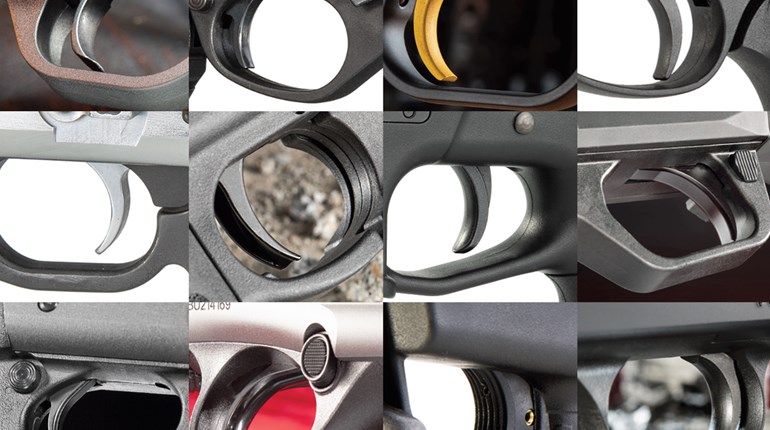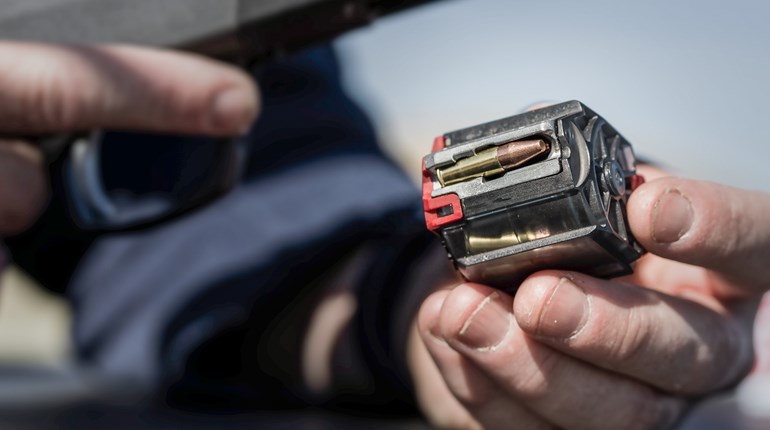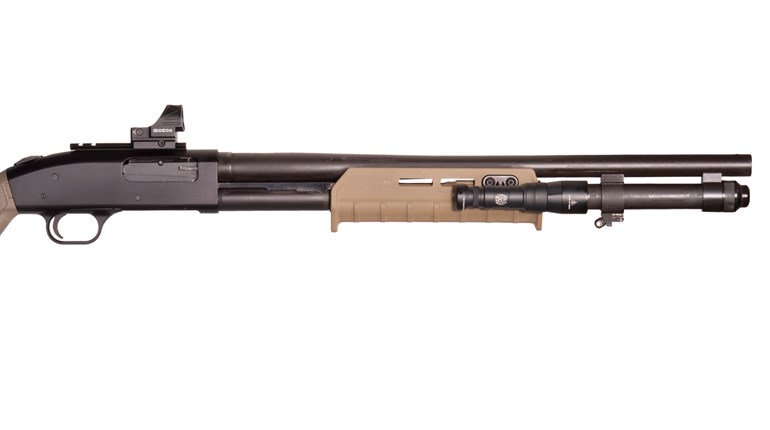
While campaigning for his 2016 presidential bid, then-candidate Donald J. Trump courted America’s 100-million-plus gun owners with pro-gun rhetoric and promises to protect the Second Amendment. For example, when questioned about the hot-button topic of “universal background checks,” he said, “Very few criminals are stupid enough to try and pass a background check.”
But as most savvy voters—certainly NRA members—know, what candidates say they’ll do and what they actually do while in office can be very different things. Voting records are what count, so to get a more accurate idea of what President Trump will do regarding gun policy during a prospective second term, let’s take a detailed look at his actions on gun issues during his first four years in office. Here we’ll examine Trump’s opposition to anti-gun legislation via his veto power as chief executive; the gun policies his administration maintained; and the judicial impact his administration has made in regard to our Second Amendment.
President Trump’s Veto Threats
Overwhelmingly, the president has kept his promise to protect Americans’ right to keep and bear arms; for example, in 2019, the Trump White House issued a statement threatening to veto two gun-control bills passed by the U.S. House of Representatives, if those bills somehow made it through the U.S. Senate.
H.R. 8, the “Bipartisan Background Check Act,” would have imposed sweeping universal background checks on the American public, requiring nearly every private transfer of a firearm to be conducted through a federal firearms licensee even in cases of temporary borrowing of a gun for recreation or self-defense. In threatening to veto the bill, the White House stated that the “extensive regulation required [by the bill] ... is incompatible with the Second Amendment’s guarantee of an individual right to keep and bear arms.”
Similarly, H.R. 1112, the “Enhanced Background Check Act,” would have extended the time allowed for the FBI to complete a background check from three to 10 days. The bill absurdly placed the burden on the buyer to petition the government for background check results after the initial 10-day period had elapsed, after which time the FBI would have an additional 10 days to complete the check. In the veto threat, Trump’s team argued that “allowing the Federal government to restrict firearms purchases through bureaucratic delay would undermine the Second Amendment.”
President Trump has also honored his commitment to pro-Second Amendment causes on a global level. In April 2019, while speaking to NRA members at the NRA-Institute for Legislative Action Annual Leadership Forum, Trump announced his “un-signing” of the anti-gun United Nations Arms Trade Treaty that former President Barack Obama had ratified in 2013. This act demonstrated to the world his commitment to unique American freedom and sovereignty regardless of worldly political pressure. It effectively withdrew the United States from a global march toward international gun prohibition and reaffirmed America’s founding promise of self-governance.

President Trump’s Pro-Gun Policies
Early in his first term, federal agencies under Trump’s direction reversed course on several Obama-era policies that would have jeopardized Americans’ Second Amendment rights. For example, Trump rescinded an Obama regulation that would have effectively stripped the Second Amendment rights of any person who, on a form submitted to the Social Security Administration, simply checked a box stating that he or she may not be able to manage their finances due to a mental impairment. By law, before the government can prohibit a person from possessing a firearm, it must first prove, generally via a hearing or trial, that the person is a convicted criminal, has been adjudicated as a danger to themselves or others due to a mental illness, or is otherwise disqualified from possessing a firearm. The Obama rule, however, would have declared tens of thousands of Americans ineligible to exercise a constitutional right without first providing them due process. In commenting about the rule change, Trump’s White House said the old rule “could endanger the Second Amendment rights of law-abiding citizens.”
Most recently, the Trump administration lived up to its pro-Second Amendment billing by battling against state closures of gun stores, shooting ranges and government-permitting offices (as in, those offices that issue carry permits, or those in states that require a permit in order to simply purchase or possess a firearm) during the COVID-19 pandemic. In March and April of 2020, multiple state and local jurisdictions put politics ahead of constitutional rights when they shuttered gun stores by labeling them “non-essential businesses.” Residents in these places who did not already own guns were essentially prohibited from exercising their constitutional rights for an unforeseen time period until officials of those jurisdictions subjectively deemed the lockdown over. The result would have been tantamount to a tyrannical gun ban when Americans needed guns most.
While the federal government cannot override state definitions of “essential business,” the Trump administration issued federal guidelines deeming gun stores and gun ranges, as well as firearm and ammo manufacturers, as “critical components of the nation’s workforce.” The guidelines recommended that states allow those businesses to continue operating during the pandemic. There is little doubt what an Obama, Clinton or Biden administration would have done during this time, and it likely wouldn’t have been good for vulnerable people looking to protect themselves during this dire time in American history.
Officially, this federal guidance applied only to the enforcement of federal laws or regulations, but it emboldened legal challenges to state closures and suggested that the federal government might intervene in such lawsuits on behalf of gun owners. As a result, several jurisdictions—including New Jersey and Los Angeles County—reversed their original edicts to close gun stores and allowed business as usual.
According to NRA-ILA Executive Director Jason Ouimet, “[President Trump’s] declaration validated what the NRA and our membership have always known: There is no more fundamental freedom than the right to protect ourselves, our families and one another. Tens of millions of American gun owners, including millions of new gun owners, are grateful to President Trump and his administration for opposing the un-American notion that self-defense is ‘non-essential.’”
Finally, President Trump has repeatedly extolled the dangers of so-called “gun-free zones,” and as of July 2020, is working to change an Army Corps of Engineers rule that prevents carrying firearms on more than 12-million acres of federal lands. He has also supported America’s legion of 20-million gun-toting hunters by backing efforts to expand millions of acres of public access and reverse nonsensical bans on traditional ammunition for hunting. In fact, Trump’s sons Eric and Donald Trump Jr. are avid hunters and gun owners who have a deep understanding of often-misunderstood matters involving America’s public hunting lands, firearms and renewable resources.
President Trump’s Judicial Nominations
“Generations of Americans will benefit from [Trump’s] promise to transform the federal judiciary,” said Ouimet. “By appointing a record-setting number of judges who respect and value the Second Amendment—including U.S. Supreme Court Justices Neil Gorsuch and Brett Kavanaugh—President Trump reversed a disturbing trend of appointing activist judges. The long-term impact of these lifetime appointments cannot be overstated, and the NRA knows that his focus on the judiciary will continue to be a very high priority during a second term.”
The president’s most-enduring legacy to the Second Amendment may very well be his federal judicial nominees, who often stand as lone bulwarks against future attempts by anti-gun lawmakers and civil lawsuits to chip away at the U.S. Constitution.
Most importantly, by nominating judges who understand the role of the judiciary—to rule on legal precedent, rather than to fashion laws that align with their personal views—Trump has helped decrease the risk that federal judges will undermine the right to keep and bear arms based on popular or political sentiment, and instead rule according to the guidelines set forth by the founders in the U.S. Constitution.

When Trump arrived in the Oval Office, he inherited 114 federal court vacancies from Obama, and by December of 2017 that number had grown to 144. Until the U.S. Supreme Court discontinues its reluctance to hear Second Amendment cases, it is these federal and appellate courts that will be pivotal in determining future gun laws in those districts. So far—judging by the few Second Amendment cases that have been decided during his term—Trump has chosen wisely.
Indeed, both of the U.S. Supreme Court justices that President Trump nominated, Justices Gorsuch and Kavanaugh, have signed dissents that were very critical of the high court’s decision to pass on important Second Amendment-related cases. Still, those two justices are far from Trump’s only judicial nominees to prove themselves as Second Amendment saviors.
For example, Judge Amy Coney Barrett of the Seventh Circuit Court of Appeals wrote a strong dissent in a case where two of her colleagues voted to uphold a Wisconsin law imposing a lifetime ban on gun ownership for non-violent felons. In this particular case, the crime was a single count of mail fraud involving a Medicare reimbursement check.
Similarly, Judge Stephanos Bibas of the Third Circuit penned a scathing dissent when the other two judges on a panel upheld New Jersey’s ban on “high-capacity magazines” as “reasonably fit[ting] the State’s interest in promoting public safety.” Judge Bibas chastised the majority decision for failing to adhere to Second Amendment and U.S. Supreme Court legal precedent already set. He reminded them that their job as judges is not to “water [the Second Amendment] down and balance it away based on our own sense of wise policy.” Rather, “the Framers made that choice for us. We must treat the Second Amendment the same as the rest of the Bill of Rights.”
In another case, four Trump-nominated Fifth Circuit judges joined together in a notable opinion dissenting from the Circuit’s denial of a request to re-hear an important Second Amendment case. The case involved the federal prohibition on interstate handgun sales that required all handgun sales to out-of-state buyers first be transferred to an in-state dealer.
“Importantly,” they wrote, “[o]ur Founders crafted a Constitution to promote the liberty of the individual, not the convenience of the Government.”
Most recently, Judge Kenneth Lee, who President Trump appointed to the Ninth Circuit Court of Appeals just last year, authored an opinion striking down California’s draconian ban on “large-capacity” magazines. Judge Lee’s opinion noted that the effect of the ban made “half of all magazines in America ... unlawful to own in California” and highlighted that this put the ban direclty at odds with the “common use” test laid out by the U.S. Supreme Court in D.C. v. Heller.
Finally, there is the important question of who gets to replace the next U.S. Supreme Court justice or justices. Such an event could protect the Second Amendment and Americans’ way of life for decades to come. Based on his track record of nominating judges, President Trump is likely to nominate a justice who will uphold the U.S. Constitution; whereas Joe Biden, if he were to win the presidency, would surely nominate someone who would do all they can to erase the Second Amendment from our U.S. Bill of Rights.
In sum, President Donald Trump is the clear choice when it comes to protecting the Second Amendment and the U.S. Constitution.


































